Cannabis plants have been used for medicinal purposes for thousands of years. Today, researchers are studying two of the plant’s compounds, CBD and THC, to understand their therapeutic properties. Both CBD and THC interact with the body’s endocannabinoid system, but they produce different effects.
Table of Contents
In this article, we’ll take a closer look at CBD vs THC and explore their benefits, side effects, legal status, and more.
CBD vs THC: What are They?
CBD (cannabidiol) and THC (tetrahydrocannabinol) are two of the more than 100 cannabinoids found in cannabis plants. Both compounds interact with the body’s endocannabinoid system (ECS), which is responsible for regulating various physiological processes such as appetite, sleep, mood, and pain.
While both CBD and THC have similar chemical structures, they have different effects on the body. THC is psychoactive, meaning it produces a “high” sensation, while CBD is non-psychoactive and doesn’t produce a high.
How Do CBD and THC Affect the Body?
CBD and THC interact with the body’s ECS in different ways. THC binds to the CB1 receptors in the brain and central nervous system, producing a euphoric effect. This is why THC is often associated with recreational use and the feeling of being “stoned.”
In contrast, CBD does not bind directly to CB1 or CB2 receptors, but it does modulate their activity. CBD can also interact with other receptors in the body, such as serotonin and vanilloid receptors, to produce various effects.
Benefits of CBD vs THC
Both CBD and THC have potential therapeutic benefits, and ongoing research continues to explore their potential uses.
CBD has been shown to have anti-inflammatory, analgesic, and neuroprotective properties. It may also have potential benefits for treating conditions such as anxiety, depression, and epilepsy.
THC has been shown to have pain-relieving, anti-nausea, and appetite-stimulating properties. It may also have potential benefits for treating conditions such as glaucoma, multiple sclerosis, and PTSD.
Side Effects of CBD vs THC
While CBD and THC have potential benefits, they can also have side effects.
CBD is generally well-tolerated, and side effects are rare. Some people may experience mild side effects such as dry mouth, drowsiness, and changes in appetite or mood.
THC can cause more significant side effects, particularly at higher doses. Common side effects of THC include dry mouth, red eyes, increased heart rate, impaired coordination, and anxiety or paranoia.
Legal Status of CBD vs THC
The legal status of CBD and THC varies depending on where you live. In the United States, for example, CBD derived from hemp plants containing less than 0.3% THC is legal at the federal level. However, THC is still considered a Schedule I drug under federal law.
In some states, both medical and recreational use of cannabis products containing THC is legal. However, in other states, only medical use is legal, and in some states, all cannabis use is illegal.

FAQs about CBD and THC
Q: Is CBD legal?
A: The legality of CBD varies by country and state. In many places, CBD derived from hemp is legal, but CBD derived from marijuana may be illegal.
Q: Will CBD make me feel high?
A: No, CBD does not produce a high like THC does. It is non-psychoactive and does not alter your state of mind.
Q: Can CBD and THC be used together?
A: Yes, CBD and THC can be used together. This is known as the entourage effect, where the two compounds work together to enhance each other’s effects.
Q: What is the best way to take CBD or THC?
A: The best way to take CBD or THC depends on the individual and the condition being treated. CBD can be taken orally, sublingually, topically, or inhaled. THC can be taken orally, inhaled, or applied topically.
CBD vs THC: Conclusion
CBD and THC are two compounds found in cannabis plants that interact with the body’s endocannabinoid system. While they share some similarities, they also have distinct differences in their effects and benefits.
CBD is non-psychoactive and has potential therapeutic benefits for conditions such as anxiety, depression, and epilepsy. THC is psychoactive and has potential benefits for conditions such as pain, nausea, and appetite stimulation.
Both CBD and THC can have side effects, and their legal status varies depending on where you live. It’s important to consult with a healthcare professional before using CBD or THC for therapeutic purposes.
Overall, the research on CBD and THC is ongoing, and there is still much to learn about their therapeutic potential. However, with growing interest in natural remedies, CBD and THC are becoming increasingly popular options for those seeking alternative treatments.




[…] addressing these common misconceptions and educating people about the true nature of CBD oil, we hope to encourage more people to try this natural supplement and potentially improve their […]
[…] is important to note that the legal status of CBD and THC varies by state and country, and users should always consult with their healthcare provider and […]